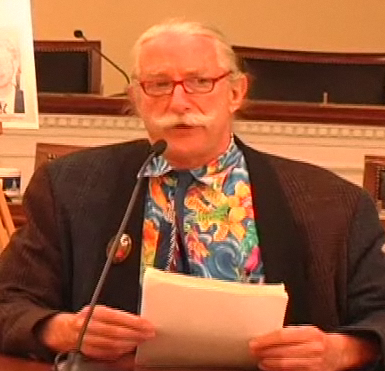Patch Adams continues fighting for joyful, loving health care


It’s been a dozen years since the world learned of Patch Adams, in the movie Patch Adams, starring Robin Williams. I haven’t seen it, but I learned last week that the real Adams is anything but Hollywood.
Founder of the Gesundheit Institute in rural West Virginia, Adams is on a life mission to change the way health care is given, received and valued. After treating 15,000 patients in its first 12 years (all at no cost to the patients), the institute started the next phase of Adams' vision, building a full-scale model of his dream hospital—where compassion and intimacy replace malpractice insurance; and fun and silliness quash liability waivers. Patients will pay nothing and staff will make next to nothing, but caregiver burnout and third-party insurance will be nonexistent, and there will be joy.
Adams continues raising money for his teaching center and clinic, while lecturing around the world about the need for a drastic change in health care. He testified on Capitol Hill last year (see video here). We spoke on the phone one evening last week.
In your speeches, you talk about modeling creative problem-solving to improve health care. How do you suggest people start thinking more creatively?
How do we get people to think? We’re so far away from thinking. I suspect that less than 10 percent of our nation thinks. In the same way we use our hands to cook and eat, but to use our hands to play the piano—that’s different. It’s best to have a system that trains out thinking—thinking being dangerous to the paradigm.
That sounds grim.
Have you not had the same thoughts? People regurgitate things they hear, like “terrorist” or “socialism.” They’re doing so little thinking, they’re actually arguing against the thing they need. How is it that in a country whose documents talk about “of the people, by the people, for the people,” that we are the only industrialized nation in the world that doesn’t have a health care system that takes care of its people? It’s inconceivable.
In this meaningless health care bill, we come up with a plan where people have to pay into insurance companies. The [administrative costs] to insurance companies is 30 percent. If it were a single-payer system that would be dramatically different. There hasn’t been a positive book or article in 40 years on the way we deliver health care. I have a huge library on the ways we criticize health care, but nothing positive. One doesn’t have to be a scholar to ask what is wrong with this picture.
What can we do?
When you ask what can we do to have people think about these issues, my response is that people are more interested in professional sports than thy are in any social, political or environmental issue. The Super Bowl—multimillionaires playing with their balls--is interesting. But 11 million Americans going to bed hungry is not interesting. The fact that the Patriot Act broke six of the 10 Bill of Rights, that's not interesting.
That’s why I’ve stuck to my model, which is entering its 40th year. Without a model, we don’t think something can be done. If we had a hospital model at only 10 percent of the cost, that would shape things. We can certainly show other countries’ models, that caring for people at much cheaper rates is possible.
What’s your philosophy behind bringing fun and play into health care?
In health care reform, all they talk about is cost. They don’t talk about how burnout is epidemic everywhere in the world. If we require our staff to be happy, loving, creative and thoughtful, we can create an atmosphere where it's fun to be a caregiver and fun to be a patient. As Mary Poppins said, “In every job that must be done, there is an element of fun.”
Our injecting love and fun in our practice is because we don’t want to give out psychotropic medications, but rather, show that life is a celebration. It’s a glorious thing to be alive. How can we get a surgeon to work for $300 a month and the clearing person to work for $300 month, and thousands of people are applying? The surgeon will trade $2 million a year to have their family living a life of fun and love. The problem is, most people are lonely, bored and frightened. Two books I’m trying to get people to read are Loneliness by John Cacioppo and The Loss of Happiness in Market Democracies by Robert Lane.
What are you reading now?
Just as you called-- Schools for Growth: Radical Alternatives To Current Education Models. My library is 30,000 books. There’s no John Grisham here. No Danielle Steel. I have 2,000 on the environment and 1,000 on war and violence and some peace, but there’s not much peace. I try to read 150 to200 books a year. I take 120 monthly magazines. I travel 300 days a year. If you don’t like things the way they are, then why not imagine you can change things?
How is your fundraising campaign going?
I haven’t had a moment’s discouragement in 40 years. That’s the power of a good idea. We have a $10 million fantasy. Were we to have a full operating hospital model, where staff and patients are happy to be there, feel how dangerous that would be.
We have an elective every October for medical students on humanism in medicine. We had them last year from Japan, Philippines, Brazil, Germany, England, U.S., Canada and Mexico. Even though we’re not seeing patients, they came to spend a month to learn about loving your patients. There’s a hunger in the world for something other than the worship of money and power. We're trying to live a life filled with compassion. To my knowledge we are the only hospital model the world addressing all the problems of health care in one model—with all the healing arts, the eco village, no burnout.
Everything I read makes me believe we will be extinct this century. We are too fragile a species. We will not survive our misbehavior. We have sold out to the love of money. I will pay attention to sports when a schoolteacher makes more than an athlete. We need a value system based on compassion and generosity. We need a massive revolution of loving—which is superficially tweaked when we have a disaster like Haiti. Image how embarrassing it is for me when people think the Hollywood movie is what I’m about.
I haven’t seen it. Should I?
I was embarrassed for the movie, and I've come to love it for its impact. I get thousands of letters saying the movie made me go into medicine or decide to help humanity. People are so hungry for love and compassion. So for that reason, maybe you should see it.
This post was originally published on Smartplanet.com